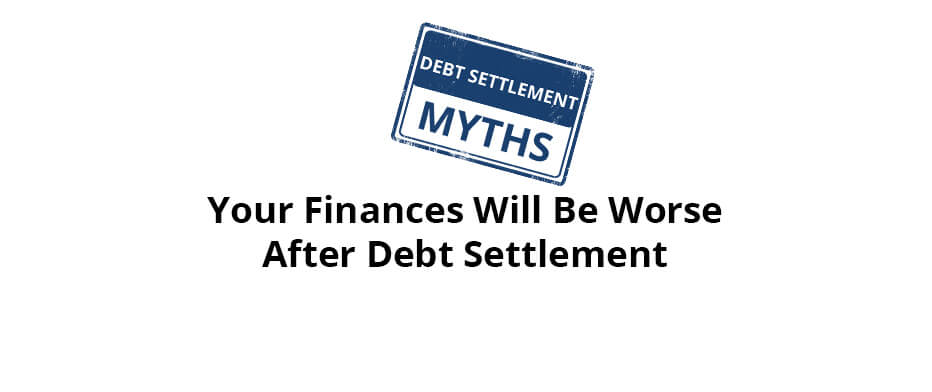Myth: Your Finances Will Be Worse After Debt Settlement


Key Takeaways
- Debt settlement can improve your financial wellbeing by helping you eliminate high-interest debt.
- High debt levels are a barrier to financial success
- Your credit score is only one part of your financial health
Reality: The goal of debt settlement is to get you back on your feet financially. When you follow the program recommendations, debt settlement could significantly improve your financial well being.
Financial health and credit scores do not always work in concert. Consumers who carry too much debt will often have the fewest assets. Because of the high cost of maintaining consumer debt, it can prevent you from achieving a healthy balance sheet.
Too Much Debt Can Be the Biggest Barrier to Financial Success
Nearly everyone, regardless of income, must balance their income with the cost of living a particular lifestyle. High debt levels mean more of your money goes toward yesterday’s purchases, leaving you with less to pay for today’s needs or to prepare for tomorrow. Anytime you bridge the income gap with debt, you will eventually run out of money, placing a roadblock in the path to financial success.
While you might worry that debt settlement will ruin your finances, the truth is it can bring hope that you can turn things around. Through debt settlement, you can eliminate debts with less money out of pocket and in less time than any other debt relief program outside of Chapter 7 bankruptcy. Paying off creditors allows you to prepare for your future financial needs.
Spending the next 30 years, making minimum payments on your high-interest debt could result in paying up to three times your original purchase amount. It might prevent you from building a strong financial balance sheet, and you could run out of time, leaving you at retirement age without the means to stop working.
Budgeting is the Key to Improving Your Finances
Using a budget to direct spending can ensure that you live within your means. Debt arises when you spend more than you make and use financing, through loans or credit cards, to bridge the gap. Failing to learn fundamental budgeting skills could put you back in the same financial predicament that necessitated debt settlement.
To avoid repeating the same financial mistakes, follow a monthly budget, and develop healthy spending habits.
Credit is Only One Part of Your Financial Health
Most consumers focus too much on credit, treating the credit score as the determining factor to financial health. Yet, credit is only one element of your financial balance sheet. Acquiring assets that grow faster than inflation is much more important than the ability to borrow more money.
Credit becomes important if you need to take on more debt, but it does not measure your financial well being. It is more favorable to have a lower credit score and larger savings than a high credit score and live paycheck-to-paycheck.
Assets to Build Wealth
Excellent credit may save you a few dollars on your insurance premiums and make it easy to get an additional credit card, but it won’t fund your retirement. Building wealth requires the discipline to manage money,so you regularly contribute to an emergency fund, retirement accounts, and other financial priorities.
When you pay hundreds of dollars in servicing your debt with interest payments each month, it is harder to find the funds needed for vacations, emergencies, and retirement. Yet without savings and investments, you may need to tap into debt as your financial backup plan. This catch 22 result in a continual state of being broke. Debt settlement can break the debt cycle, giving you more financial freedom.
Final Thoughts
Debt settlement is a tool that can not only provide immediate financial relief, but offers hope that you can transform your finances and have a better future. If you learn to budget and control your spending through the debt settlement process, you could finish the program in a more favorable financial position than when you started.
FAQ

REPRESENTATIVE EXAMPLE OF APR
If you borrow $30,000 over a term of 5 years (60 months) with an APR of 4.99% you will pay $566.00 each month. The total amount payable will be $33,959.97, with total interest of $3,959.97.
ANNUAL PERCENTAGE RATE (APR)
Annual Percentage Rate (APR) represents the annualized interest rate you are charged for borrowing. It is the combination of the nominal interest rate and some additional costs such as fees involved when incurring debt. Our lender offers APRs for personal loans, cash advance loans, installment loans and debt consolidation loans from 4.99% to 35.99%. Since New Start Capital does not directly issue loans, we cannot deliver any specifics or guarantee the APR you will be offered. The APR depends solely on your lender’s decision, based on various factors including your credit score, credit history, income, and some other information you supply in your request. For more information regarding the APR contact your lender.